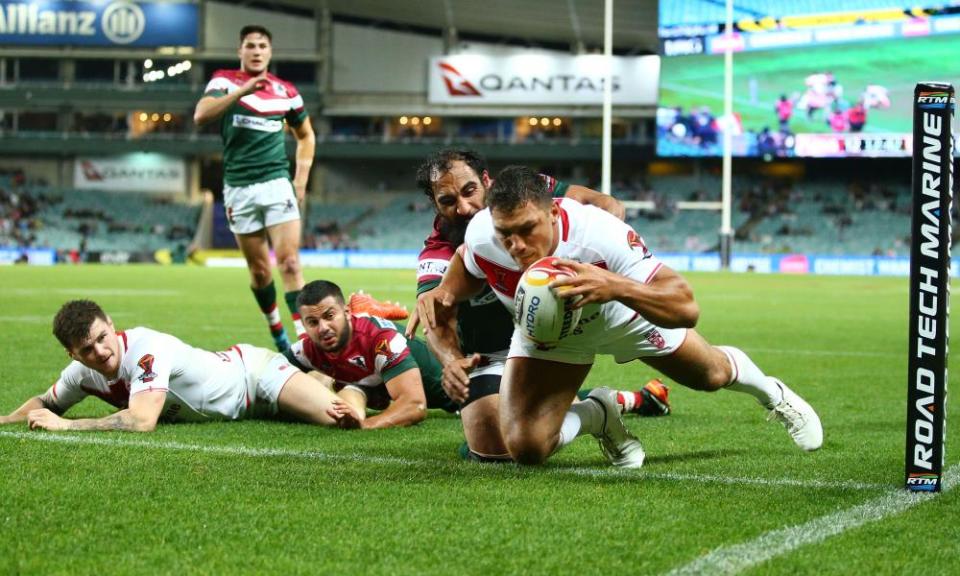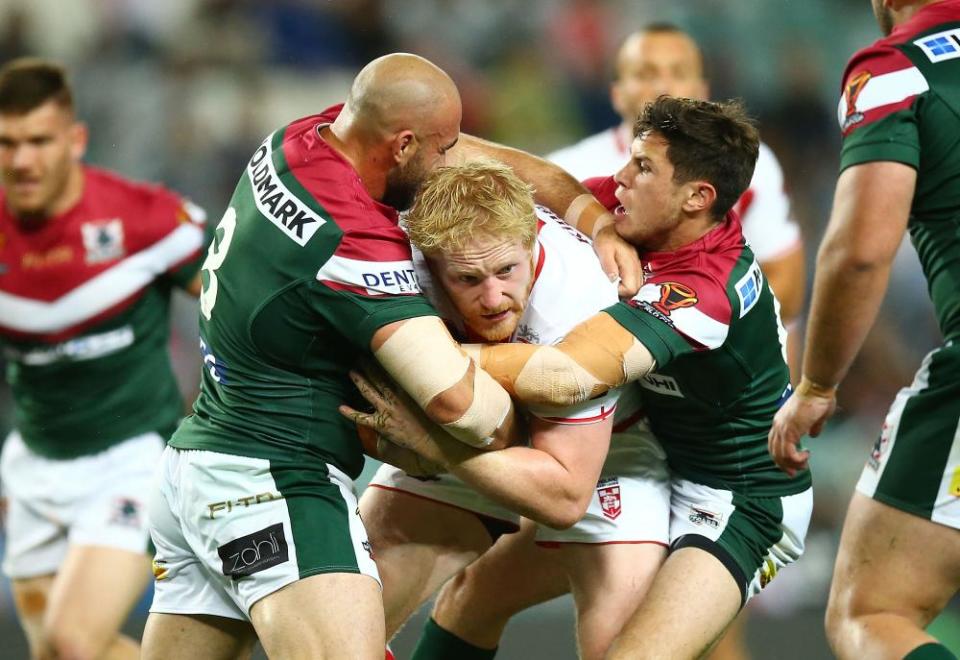England made to work in beating Lebanon at Rugby League World Cup

This was job done by England, ticking the first box required at the World Cup, if nothing else. A quarter-final place is now all but secure. Victory against France would guarantee second place in Group A and a last-eight tie against either Papua New Guinea and Ireland.
Yet with the message emphasised that England would improve as the tournament goes on, this was a slightly underwhelming performance. As Wayne Bennett pointed out, there were good parts – such as the seven-minute purple patch before half-time that gave Lebanon too much to do – but there were also disappointing aspects.
“The first half was pretty good,” the coach said. “I was really pleased with our ball control and the way we gave ourselves opportunities and we defended pretty good. But we lost our way in the second half with the football particularly. Defensively again we stood up but we’ve got to be better than that.”
The England captain, Sean O’Loughlin, agreed with Bennett’s assessment. “We came in pretty pleased at half-time but we didn’t finish the game off the way we wanted to. We’re a little bit disappointed but it’s a win and we’re off and running.”
There were disappointments off the field, too, with a crowd of just 10,237 inside the 44,000-capacity Sydney Football Stadium; more people watched Samoa play Italy in Halifax at the 2013 World Cup.
Credit, however, is due to Lebanon for the way they applied themselves. When England established a commanding 22-6 half-time lead, many suspected that the Cedars – cheered on by a significant portion of Sydney’s Lebanese community – would fall away. That their second-half defeat was only confirmed by Gareth Widdop’s drop goal on the hooter epitomises the character and endeavour that has made Lebanon one of the most eye-catching stories at this World Cup. They will qualify for the quarter-finals, too, providing England beat France in Perth next Sunday.
That game is equally important for England, for it gives them another, much-needed, opportunity to fine-tune their preparations. Make no mistake, they were worthy winners in Sydney and they did what they needed to do, but by the time they reach a quarter-final, or even a semi-final, they will need to be better than this showing.
They also face an anxious wait to see if one of their standout players will be available for selection, following an allegation of biting against the winger Jermaine McGillvary.

Controversy aside, McGillvary was one of England’s strongest performers – and he scored one of the four tries that put them in control at half-time. Nick Kassis had given Lebanese supporters something to cheer when his try levelled the scores at 6-6, but as the first half wore on England steadily improved.
Tries from McGillvary, Ryan Hall, making it 33 in 34 Tests for the Leeds winger, and Ben Currie seemed to suggest England had clicked into gear following that early scare and the belief was that they would get better in the second half. Sadly, the expected onslaught did not materialise.
Lebanon frustrated England, but there were a number of missed opportunities in attack. Tom Burgess scored England’s only second-half try, a rampaging run from almost the halfway line by the replacement prop, to which Jason Wehbe responded for the Cedars in the closing moments. It was no less than they deserved.
England: Ratchford; McGillvary, Watkins, Bateman, Hall; Widdop, Gale; Graham, Hodgson, Hill, Currie, Whitehead, O’Loughlin. Interchange Walmsley, Williams, Heighington, T Burgess. Tries Watkins, McGillvary, Hall, Currie, T Burgess. Goals Widdop 4. Drop goal Widdop
Lebanon: Abou Slieman; Robinson, Maarbani, Doueihi, Miski; Moses, Farah; Mannah, Clark, Mamary, Twal, Ellaz, Kassis. Interchange Lichaa, Moujalli, Wehbe, Sukkar. Tries Kassis, Wehbe. Goal Moses.
McGillvary accused of biting Farah
England’s win was overshadowed by an allegation of biting, levelled against Jermaine McGillvary by the Lebanon captain, Robbie Farah. The referee, Ben Thaler, did not punish the England winger but put the incident on report and it will now be scrutinised by the tournament’s match-review panel on Monday.
Farah, who complained he was bitten on the arm while making a tackle at the start of the second half, said: “Things happen in a split second on the field and you react. I made a complaint on the field and I’ll leave it at that. I don’t think I need to say much else. There is a bit of footage there. It’s pretty clear for everyone to see what happened on the replay.” However, television replays of the incident were inconclusive and the BBC pundit Robbie Hunter-Paul said he did not see evidence that McGillvary “opened his mouth and bit him”.
Scotland suffer another heavy defeat
New Zealand thrashed Scotland 74-6 in their World Cup Group B match in Christchurch as Shaun Johnson became their most prolific scorer in history.
Johnson scored one of his side’s 14 tries and kicked nine goals for a haul of 22 points that took him past Matthew Ridge’s record of 168. Winger Peta Hiku and stand-off Te Maire Martin both recorded hat-tricks.
It was sweet revenge for the Kiwis after being held to a 18-18 draw in their last meeting with Scotland in Workington 12 months ago as they followed up their opening 38-8 win over Samoa with another ruthless display in front of a 12,130 crowd.
The Bravehearts, who had no answer to New Zealand’s off-loading game, have conceded 124 points in their two games and now need to pick themselves up for their final group game against Samoa in Cairns next Saturday.
Scotland made a bright start, putting the Kiwis under some early pressure, but once the home side got on a roll they were virtually unstoppable. Winger Jason Nightingale was on the end of a flowing move to grab his first try and second-row forwards Kenny Bromwich and Joseph Tapine both crossed the line as New Zealand ran in three tries in a six-minute spell that turned the exercise into one of damage limitation for Scotland.
“It was a tough night,” the Scotland coach, Steve McCormack, said. “It was always a danger that, if we didn’t turn up and be at our best, something like that could happen.
“I’m really disappointed in that performance, although New Zealand were really good. In the first half they had 21 or 22 offloads and they played a good brand of football.
“I’ve said all along we’ve got a young squad and we’ll learn lessons from that. The key is to make sure we turn up with a better attitude against Samoa.” PA

 Yahoo Sport
Yahoo Sport 





































